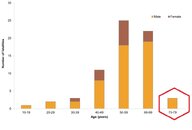From the report:
"The victims in the 67 U.S. and Canadian fatalities were male in 79% of cases (n=53) and female in 21% of cases (n=14). The vast majority of the victims — 91% of males and 93% of females — were 40 years of age or older, and a significant majority — 75% of males and 71% of females — were 50 years of age or older.
Figure 1.4-1 shows the age distribution for these 67 fatalities.
 Figure 1.4-1
Figure 1.4-1
Distribution by age and sex for U.S. and Canadian scuba fatalities, 2015 (n=67).
The medical history of the decedents was, in most cases, incomplete or unknown. "
So drop the age to 40, in the service of fairness.
Medical history was unknown, In addition to their dive history in the vast majority of incidents. In otherwords, not enough information to decide whether age alone is the cause of these fatalities.
The question is whether these deaths are out of line with the average death rate of older citizens in general. For recreational (NDL) divers, I don't believe insurance reflects a difference.
Bob






